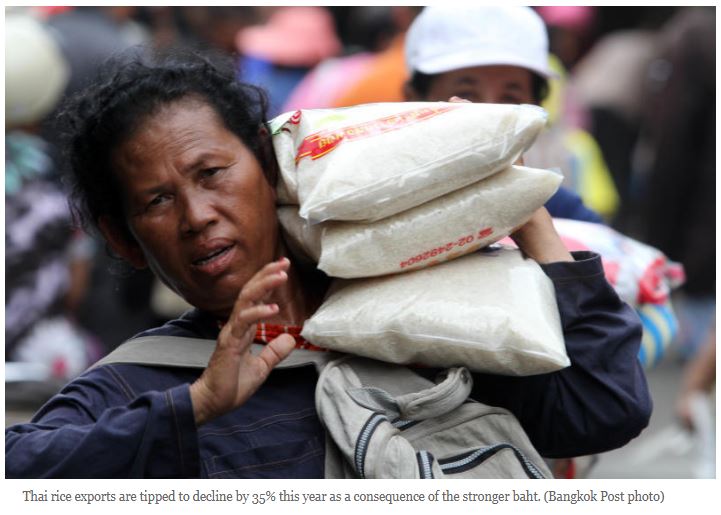Thailand: Strong baht battering rice shipments
Thai rice exports are likely to stay below targets as the strong baht weakens competitiveness in the world market.
Chookiat Ophaswongse, honorary president of the Thai Rice Exporters Association, said Thai rice shipments may slip to as low as 8 million tonnes this year, led by a sharp drop in white rice exports.
He predicts that the continued strong baht — which makes Thai rice more expensive than grains from other countries — will lower white rice shipments by up to 35% from 5.49 million tonnes last year.
“Thai rice purchase orders look inactive now,” Mr Chookiat said. “Exports totalled only 6 million tonnes at the end of September.”
The free-on-board prices of Thai 5% white rice are quoted at US$400 a tonne, while those of Vietnamese rice are quoted at $320 a tonne.
Prices for paddy rice in Vietnam are also much lower at 5,600 baht a tonne, while Thai paddy rice prices are quoted at 7,500-7,800 baht a tonne.
Mr Chookiat said the Vietnamese currency has been quite stable since last year. “Given the strong baht, we expect buyers like the Philippines, Indonesia and Malaysia to switch to buying rice from Vietnam instead of Thailand,” he said.
Normally Thailand’s rice exports average 10 million tonnes a year, with white rice making up half the amount.
Mr Chookiat said white rice shipments may reach just 3 million tonnes this year.
In July, the association cut its target for annual rice exports from 9.5 million tonnes to 9 million. Of the total, white rice will account for 3.9 million tonnes, followed by parboiled rice at 2.8 million tonnes, hom mali rice at 1.3 million tonnes, aromatic rice at 600,000 tonnes and glutinous rice at 400,000 tonnes.
Key threats to Thai rice exports include the strong baht and lower purchase demand from China, which holds hefty rice stocks.
Major rice-importing countries have also changed their rice-buying policies.
For instance, the Philippines has allowed its private sector to play a greater role in rice imports, stiffening competition in the domestic market.
The drought will cut the country’s overall rice production and may result in higher rice prices, according to the association.
“Given the strong baht, exporters themselves have yet to see a light at the end of the tunnel to raise export volume,” Mr Chookiat said. “The stronger currency is killing us.”
According to the latest report by the Commerce Ministry, Thailand’s rice exports in the first eight months fell by 26.3% to 5.3 million tonnes. Export value slid 22% to $2.87 billion.
In a move to boost rice exports, the Trade Policy and Strategy Office will ask the commerce minister to pay a visit soon to Asian buyers like the Philippines and China.
Source: https://www.bangkokpost.com/business/1756069/strong-baht-battering-rice-shipments


 English
English




